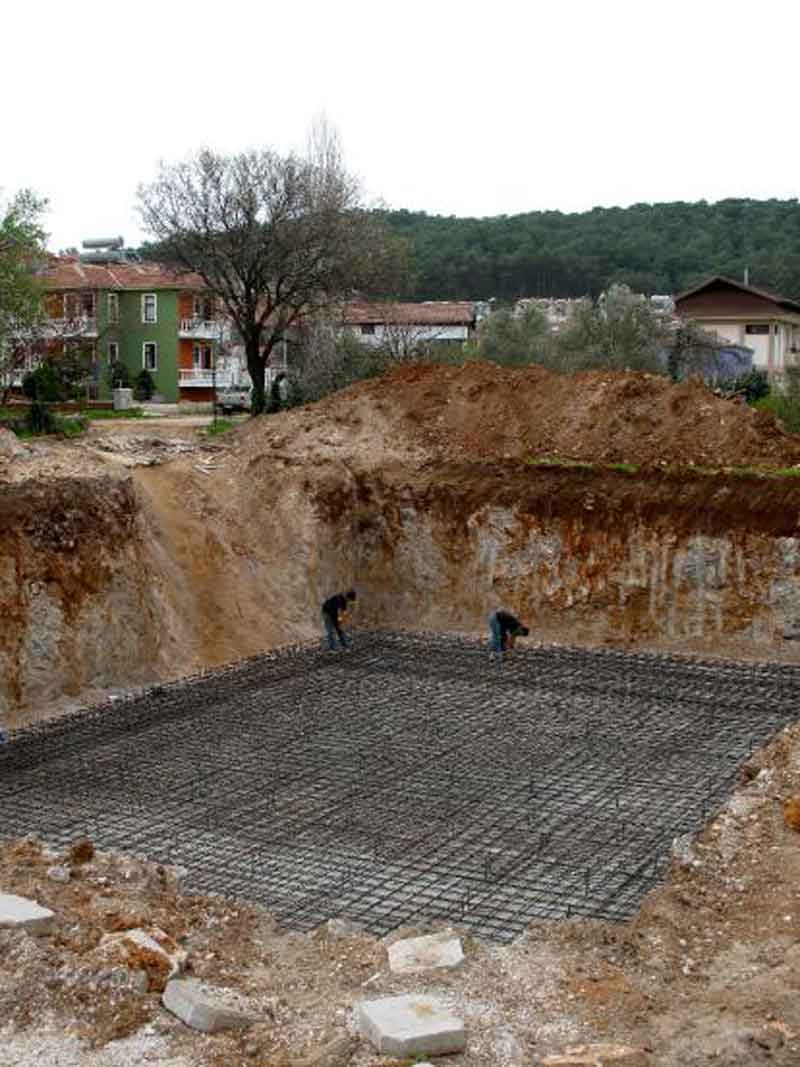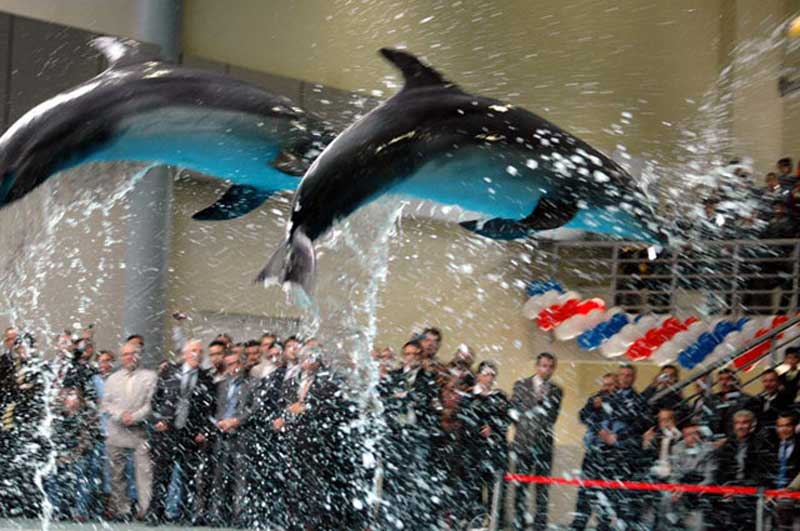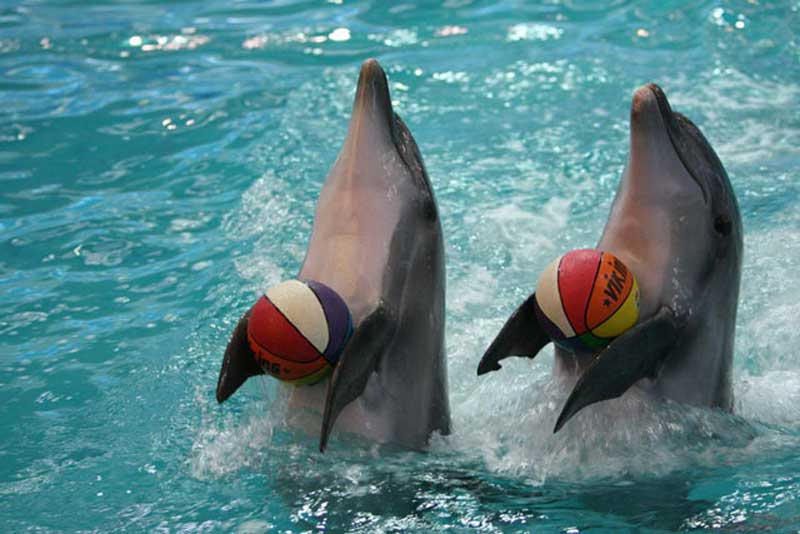https://www.haytap.org/tr/oeluedeniz-to-get-ts-first-dolphinarium
(*) Money Making Over Captivity - Oludeniz - Turkiye
İlginçtir , yabancı yayın organlarında yayınlanan bu habere yabancılar bir çok eleştiri yaptığı halde , benzer haberler Türkiye’de yayınlandığında kimsenin yorum yapmaması , dolphinarium merkezlerini protesto etmemesi hala buralara bir eğlence sektörü olarak bakması ilerde Türkiye’de daha çok benzer yerlerin açılacağının da göstergesi. Çünkü ortalama vatandaş bu gibi yerlerin açılmaması için tepki vermiyor.
Ölüdeniz to get its first dolphinarium
Although the construction of a new dolphinarium in the Hisarönü area of Ölüdeniz is a great opportunity for local businesses, environmentalists are concerned the dolphins will be kept in improper conditions.
Tourists taking their holidays in the resorts of Hisarönü, Ölüdeniz and Fethiye this season will have the opportunity to swim with dolphins, according to Ölüdeniz Mayor Keramettin Yılmaz.
“Owners of Kaş dolphinarium have rented land from the municipality,” the mayor told the Hürriyet Daily News & Economic Review. “Construction for the pool has commenced and will be completed for opening at the beginning of this summer season. I understand there will be two dolphins from the Mediterranean.”
The mayor said local business operators are expecting an increase in tourists coming to the area after the opening of the facility. “It will be great for Hisarönü and Ölüdeniz and tourists, as they will not have to travel so far.”
İbrahim Dilek, personal assistant to Alesandr Kuznetsov, general manager of Dolphintherapy Kaş, said two dolphins will be brought from the dolphinarium in Kaş to Hisarönü. The dolphins will live in a four-meter deep pool of approximately 250 square meters.
“The dolphins will spend roughly six to seven months in summer season in Hisarönü and will spend the winter relaxing in Kaş,” said Dilek.
The pool is being built in accordance with European standards and will be large enough for two dolphins to live comfortably, he said.
“The health, safety and well-being of the dolphins are our number one priority,” said Dilek. “We have a veterinarian, trainer and keepers on site. Monthly spot checks will be run by the government to ensure the dolphins are given the adequate care.”
The new center will offer therapy swims, yet the main attraction will be swimming with the dolphins.
“Basically each customer will have one hour,” said Dilek. “We provide information and training before they spend time with a dolphin. There will be up to 10 customers per dolphin.
“There will be five sessions a day with appropriate breaks throughout the day. They will work up to three hours a day, the rest will be time for the dolphins to relax.”
Hisarönü is some kilometers from the sea, so “our first priority is to transport sea water straight from Ölüdeniz. If we do not get the go ahead for this, we will look at mixing natural salt brought from the sea with fresh water,” he said.
Dilek also thinks the dolphinarium is an exciting opportunity for Fethiye, Hisarönü and Ölüdeniz and it will attract more tourists to the area, thus helping businesses.
Salih Taşcı, head of the Fethiye branch of the Turkish Association of Travel Agencies, or TÜRSAB, is delighted by the prospect.
“It’s a really popular activity for English tourists,” he said. “Until now, they’ve had to travel to Kaş and pay 50 Turkish Liras for the trip, excluding entrance fees.
“Currently, the Kaş dolphinarium takes a fee of 110 TL to swim with dolphins for six minutes. The lower cost of the tour will make it even more popular.
“The potential in Hisarönü is greater than Kaş because it is closer to Fethiye. This will pull in the crowds.”
Deniz Tangal, owner of local tourist company Activities and Homes Unlimited, is pragmatic. “I think dolphinariums are fine, provided they are constructed in a suitable place with enough space for the dolphins to live healthily. Personally, I’d prefer to see them free.”
Tangal thinks most British people living in the region would not approve of the dolphinarium. “As for the package tourists who come and go, I don’t think they would oppose it.”
Tangal became more skeptical after visiting the construction site, however, which used to be a children’s playground. “This is a dolphin pond, not a pool, it’s far too small. How do they propose that the dolphins will live here? This does not sit well with my views of how animals should be kept. They should be respected and not treated like a gimmick.”
Murat Malli from Koral Travel, a Turkish tourism agency, accepts that not everybody feels the same about captive dolphins. “We have good sales for the dolphinariums at our Marmaris and Antalya branches,” he said. “Turks are receptive to the idea of dolphin therapy, as they are genuinely intrigued by the animals. Having said that, people’s perceptions are changing about the way dolphins are being kept in captivity.”
The use of captive dolphins and whales for entertainment is a source of contentious debate, particularly following the recent death of Dawn Brancheau, a trainer who was killed by a killer whale at SeaWorld in Orlando, Florida.
Özgür Keşaplı Didrickson, coordinator of Underwater Research Society’s Marine Mammal Research Group, or SAD-DEMAG, recently told the Daily News that dolphins could only live safely in their natural habitat and that non-governmental organizations were trying to draw attention to the plight of dolphins in captivity in Turkey.
Banu Dökmecibaşı, an oceans campaigner for Greenpeace Mediterranean, said international agreements, specifically the Bern Convention, allow the use of the sea mammals only for conservation, research and education purposes.
He said their use for commercial gain under the guise of therapy, swimming or show is strictly forbidden.
“The increase [of dolphinariums in Turkey] is just unacceptable. The recent death [of four dolphins in Alanya] is one example of why cetaceans shouldn’t be exploited in this way,” she said, adding that Turkey’s Environment Ministry should act to stop the practice as should the department responsible for conservation.
“It seems that the Bern Convention’s use of the word ’exception’ provides these people with an excuse to allow these facilities,” she said. “The convention allows for exceptions of capturing [whales and dolphins] only if there is a benefit for conservation, but certainly not for fun!”
Many studies suggest that keeping dolphins in concrete pools is detrimental to their health because their sonar “bounces” off the walls. Although the Dolphintherapy Kaş Web site agrees on the matter, Dilek believes the matter is ultimately unimportant.
“The dolphins’ sonar abilities will improve when they are back in Kaş, like my Turkish did when I came back to Turkey,” he said.
Cathy Williamson, captivity campaigner, speaking by phone on behalf of the U.K.-based Whale and Dolphin Conservation Society, or WDCS, argued Turkey is doing itself a disservice.
“Nowhere in the world do knowledgeable environmental and conservation groups condone swimming with dolphins, neither in the wild nor in artificial enclosures,” she said. “Before people participate in this sort of business they should watch ‘The Cove,’ which illustrates very well the barbarity of these practices.”JANE TUNA AKATAY - ÖZLEM ÖZTÜRK
FETHİYE - Hürriyet Daily News Haberi okumak icin tıklayın



